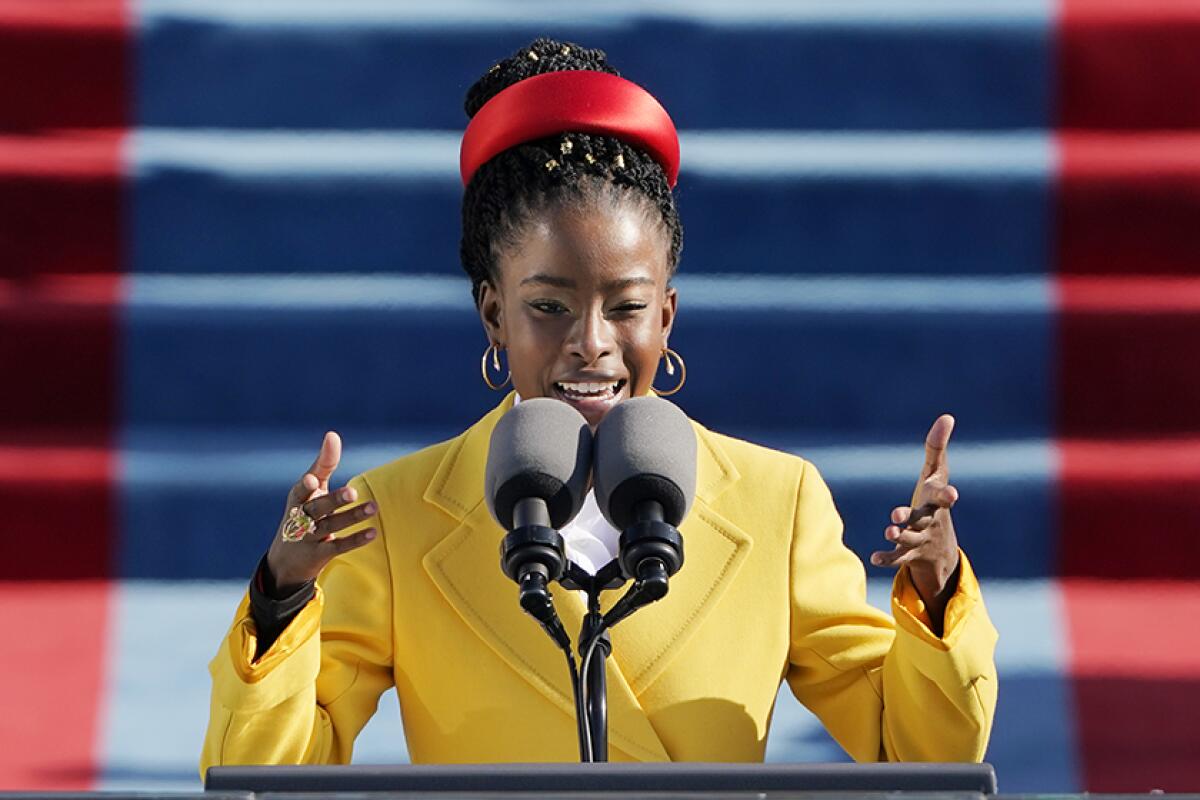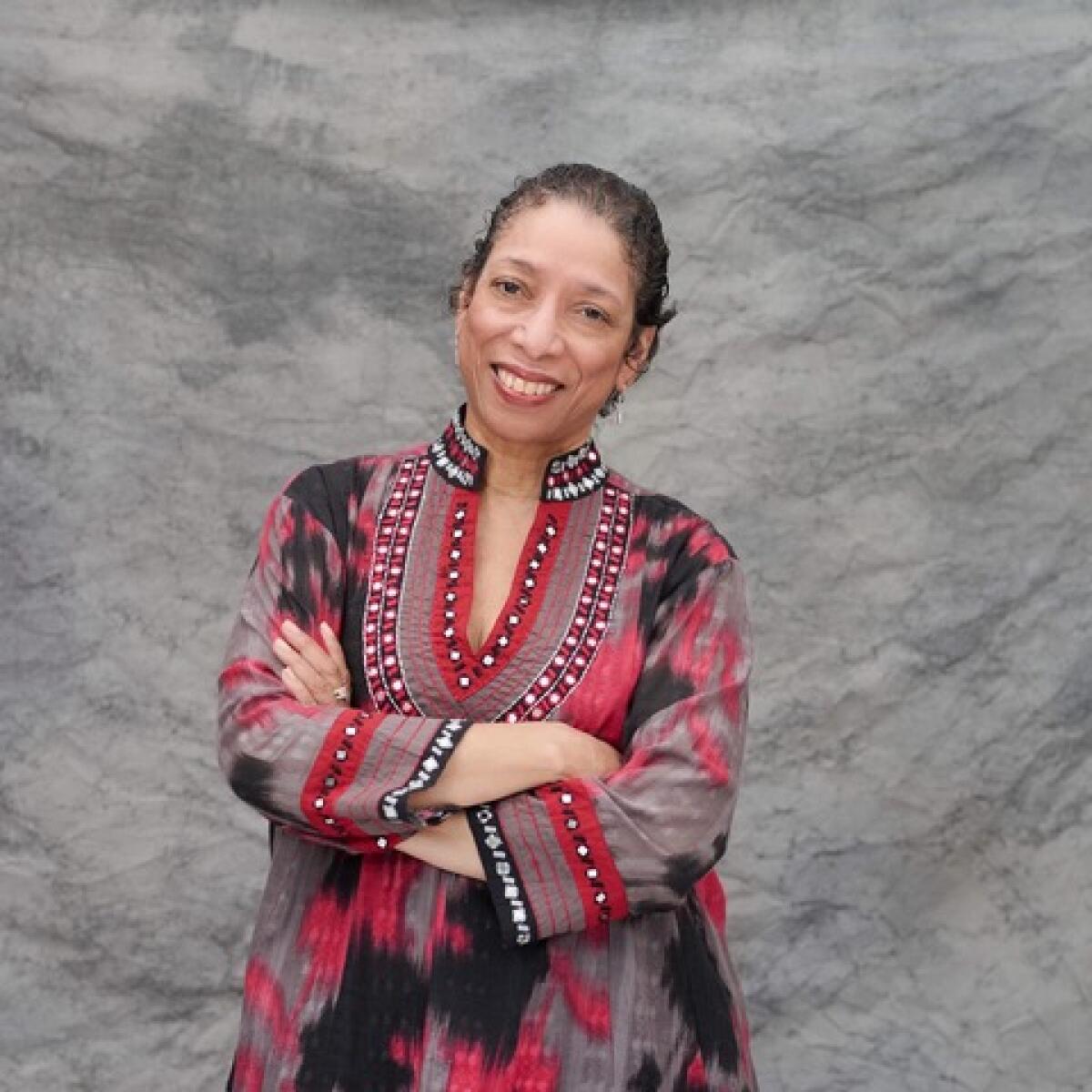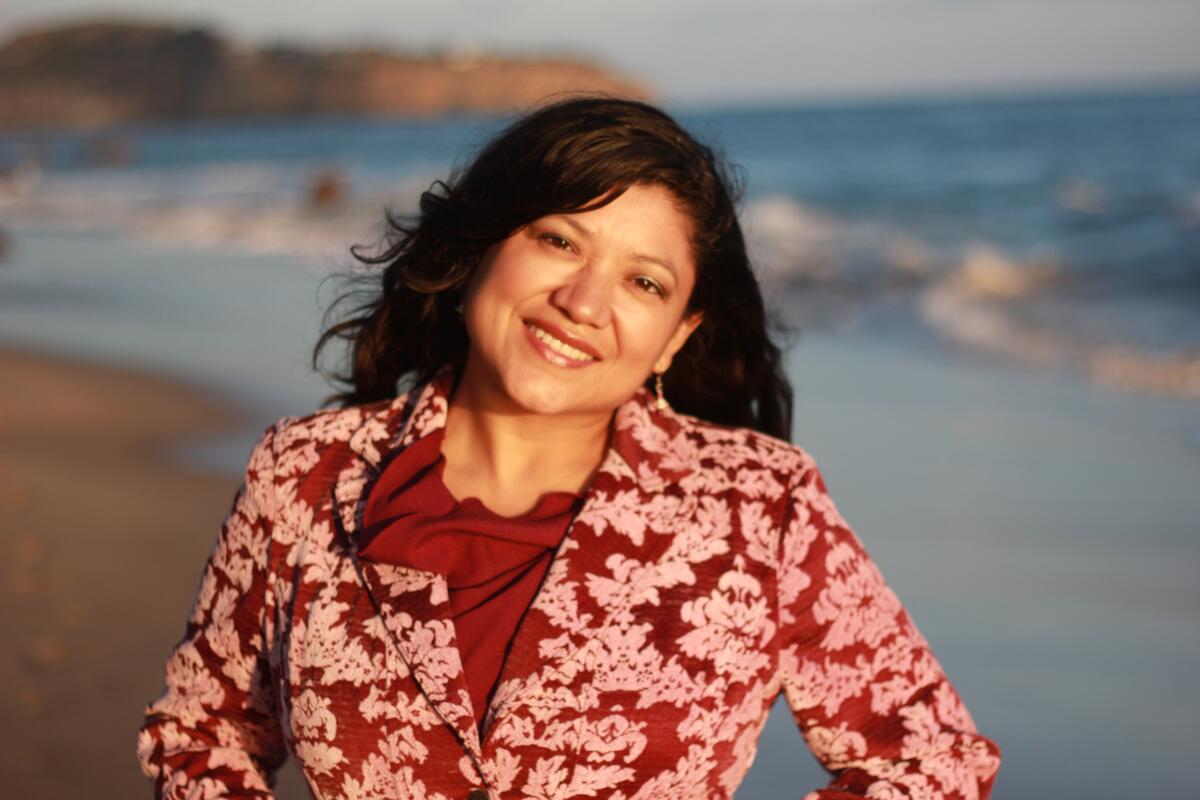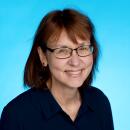Book club: How to find great poetry in L.A.

- Share via
Good morning, and welcome to the L.A. Times Book Club newsletter.
National Poetry Month is here! We’ll be celebrating and sharing all things verse throughout April with poets from across Southern California, including Amanda Gorman.
Now 24, the nation’s youngest inaugural poet will join book club readers at the Festival of Books to discuss her new collection, “Call Us What We Carry.”
Gorman will be in conversation with Natalie J. Graham, Orange County’s poet laureate, on Saturday, April 23, at 11:30 a.m. on the Los Angeles Times Stage.
Throughout festival weekend, you’ll also find dozens of performers on the festival’s outdoor Poetry Stage, among them Los Angeles’ new poet laureate, Lynne Thompson.
In advance of the festival, Thompson shared some insights into her work and suggestions for enjoying L.A.’s poetry scene.
What are your favorite places to perform? The local neighborhood venues — World Stage, Beyond Baroque, Avenue 50, to name a few — are among my favorites because I can always depend upon audiences that love poetry. Other favorites are museums — the Hammer, for example, hosts poets from time to time — and colleges and universities. I recently read at the Pepperdine campus in Malibu and it was an absolutely gorgeous spot on a perfect California afternoon with an avid audience.
Your favorite place to listen? Just about anywhere it’s being read although I’m less partial to coffeehouses — they need to make money, which means grinding those beans, often during the reading! In addition, there are numerous podcasts that feature poetry and poetry only; I love taking them along on my walks.
What podcasts do you recommend? “Poetry Centered” and the New Yorker’s “Poetry Podcast”
How did you find your voice? I don’t know how I found it but I know when I felt that I’d found it. It was writing the poem “How I Learned Where We Come From,” which was published in my first collection, “Beg No Pardon.” The poem braids two of my favorite subjects — family and cultural landscapes — and it felt natural, unforced and musical. I have continued to visit those topics in subsequent poems and to look for the music in every line.
Did you try other genres first? I didn’t, but I’m increasingly interested in other genres, particularly creative nonfiction (which I’ve written) and, maybe in the future, playwriting.
Is there a poem or poet that inspired your path? Two in particular: Pablo Neruda, whose book “20 Love Songs & A Song of Despair” made me desperate to try to emulate the music in his lines; also Jayne Cortez, who came to my college campus. I’d never seen a young African American woman read her poetry so the possibility was intoxicating as was her defiance of the rules of grammar.
As poet laureate, where have you found your most engaging audiences? The first year of my appointment has been tough due to COVID as there have been few in-person appearances and it’s difficult to gauge reactions over Zoom. However, I record a podcast — “Poems on Air” — for the L.A. Public Library. It’s also posted on Spotify and Apple Podcasts, and the response to those readings of the poems of poets I admire has been very positive.

On the Poetry Stage
The author of “Fretworks” and “Start With a Small Guitar,” Lynne Thompson began her term as L.A.’s poet laureate in 2021. You can see her on the festival’s Poetry Stage on April 24 at 2:40 p.m.
Thompson joins a roster of poets both days, among them Kate Gale, Luis J. Rodriguez, Tyehimba Jess, Forrest Gander, Edward Hirsch, Paul Tran, Adriana Ramirez, Kim Dower and Reginald Dwayne Betts.
If you go: The full Festival of Books schedule, including the outdoor L.A. Times Stage and Poetry Stage, is online. Most festival events are free. Reservations for individual author panels are available starting April 17 at 10 a.m. Friends of the festival: Get early access to event tickets and other benefits.
Poetry during the pandemic
The book club’s previous poetry event, September 2020’s “Black Poets in a Time of Unrest,” was one of our most-watched virtual meetups. (Watch here.) Author Kima Jones, the founder of Jack Jones Literary Arts, co-hosted our poetry night with me and also did a reading.
This week, Jones talked about three of her favorite local venues.
1. Beyond Baroque. This is a favorite of mine because it gives me a reason to go to Santa Monica, enjoy the beach, and then end the day with a gorgeous poetry reading.
2. The Los Angeles Public Library. This is where I got to experience readings by so many hometown favorites for the first time. Percival Everett, Dana Johnson, Lynell George, Tisa Bryant, and Robin Coste Lewis are all L.A. writers that I first came to know through programming at the downtown branch.
3. The Salt Eaters Bookshop. I’m also very excited for everything that’s brewing at the Salt Eaters Bookshop in Inglewood. It’s a new Black woman-owned bookstore that focuses on Black literature, and especially Black poetry. As if the Toni Cade Bambara homage in their name wasn’t already spectacular, I love their Zora Neale Hurston wallpaper, Latasha Harlins mural, and thoughtful curation around books both classic and urgent to the lives of Black women today.
Keep reading
On family: In January 2020, Ocean Vuong told book club readers he wrote the first draft of his bestselling novel, “On Earth We’re Briefly Gorgeous,” by hand — and in a closet. Vuong returns to poetry this month with a new collection focused on his mother’s death that incorporates fragments of her life (one poem in “Time Is a Mother” is based on her Amazon orders). “The immediacy of the verse and the universality of family loss will surely bring new readers to Vuong — and to poetry,” writes critic Bethanne Patrick.
April books: “When have we ever believed that the world wasn’t ending?” asks a character in Emily St. John Mandel’s “Sea of Tranquility.” A previous book club guest, Mandel has a new sci-fi saga about a time-travel wormhole and a group of lost souls who might hold the key to humanity’s survival. “Sea of Tranquility” is on Patrick’s list of 10 books to add to your reading list in April.
White wheels: The new issue of Citric Acid features “Ghost Bike,” poetry from writer, teacher and recumbent bicycle rider Virginia Shank. “We all travel the same unsafe streets and face the same risks; it could just as easily be any one of us.”
Romance reads: This new study analyzed Google Trends searches for “The Best Romance Novels” for every U.S. state in January 2022. The California pick? “Maurice” by E.M. Forster, via Publisher’s Weekly.
Where reading is a cure. This week’s sad news about actor Bruce Willis brings to mind Louise Steinman’s story about the Aphasia Book Club at the Echo Park Branch of the Los Angeles Public Library. It’s a lifeline for people struggling with language.

)
Reyna’s reading list
On Tuesday, author Reyna Grande joined book club readers to discuss a “A Ballad of Love and Glory” with Times editor Steve Padilla. She talked about her time at Pasadena City College, her journey as a novelist and nonfiction author, and seven years researching her first historical novel.
Grande says she read more than 100 books to learn everything she could about the Mexican-American War and the St. Patrick’s Battalion, a unit of Irish soldiers who fought for Mexico.
She shared her favorite books on the era for further reading, including the work of historians Peter Stevens (“The Rogue’s March”), Robert Miller (“Shamrock and Sword”) and Michael Hogan (“The Irish Soldiers of Mexico”). She also enjoyed “The U.S.-Mexican War: A Binational Reader” by Christopher Conway; “So Far From God: The U.S. War With Mexico, 1846–1848” by John S. D. Eisenhower; and “A Wicked War: Polk, Clay, Lincoln, and the 1846 US Invasion of Mexico” by Amy S. Greenberg.
ICYMI: Watch the entire book club discussion here.
If you enjoy our community book club: The Times has offered many book club conversations and other live journalism events free and virtual to make it easy for readers to connect with authors and newsmakers during the pandemic. Please consider supporting the new Los Angeles Times Community Fund.
Sign up for our Book Club newsletter
Get the latest news, events and more from the Los Angeles Times Book Club, and help us get L.A. reading and talking.
You may occasionally receive promotional content from the Los Angeles Times.




